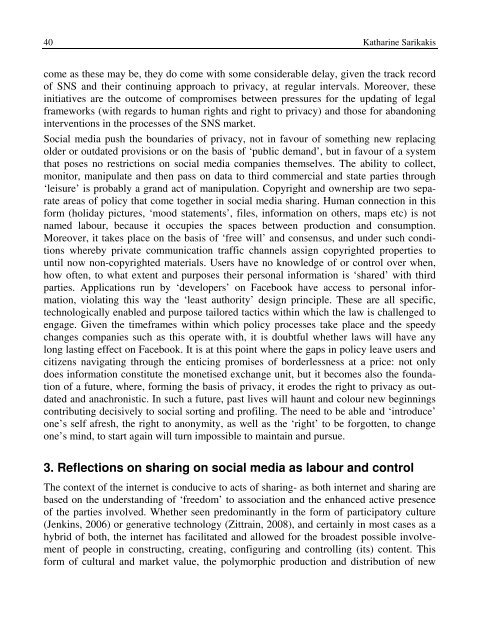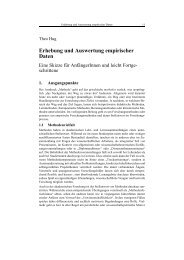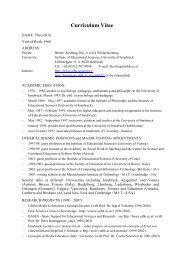Cultures and Ethics of Sharing - Universität Innsbruck
Cultures and Ethics of Sharing - Universität Innsbruck
Cultures and Ethics of Sharing - Universität Innsbruck
- Keine Tags gefunden...
Erfolgreiche ePaper selbst erstellen
Machen Sie aus Ihren PDF Publikationen ein blätterbares Flipbook mit unserer einzigartigen Google optimierten e-Paper Software.
40 Katharine Sarikakiscome as these may be, they do come with some considerable delay, given the track record<strong>of</strong> SNS <strong>and</strong> their continuing approach to privacy, at regular intervals. Moreover, theseinitiatives are the outcome <strong>of</strong> compromises between pressures for the updating <strong>of</strong> legalframeworks (with regards to human rights <strong>and</strong> right to privacy) <strong>and</strong> those for ab<strong>and</strong>oninginterventions in the processes <strong>of</strong> the SNS market.Social media push the boundaries <strong>of</strong> privacy, not in favour <strong>of</strong> something new replacingolder or outdated provisions or on the basis <strong>of</strong> ‘public dem<strong>and</strong>’, but in favour <strong>of</strong> a systemthat poses no restrictions on social media companies themselves. The ability to collect,monitor, manipulate <strong>and</strong> then pass on data to third commercial <strong>and</strong> state parties through‘leisure’ is probably a gr<strong>and</strong> act <strong>of</strong> manipulation. Copyright <strong>and</strong> ownership are two separateareas <strong>of</strong> policy that come together in social media sharing. Human connection in thisform (holiday pictures, ‘mood statements’, files, information on others, maps etc) is notnamed labour, because it occupies the spaces between production <strong>and</strong> consumption.Moreover, it takes place on the basis <strong>of</strong> ‘free will’ <strong>and</strong> consensus, <strong>and</strong> under such conditionswhereby private communication traffic channels assign copyrighted properties tountil now non-copyrighted materials. Users have no knowledge <strong>of</strong> or control over when,how <strong>of</strong>ten, to what extent <strong>and</strong> purposes their personal information is ‘shared’ with thirdparties. Applications run by ‘developers’ on Facebook have access to personal information,violating this way the ‘least authority’ design principle. These are all specific,technologically enabled <strong>and</strong> purpose tailored tactics within which the law is challenged toengage. Given the timeframes within which policy processes take place <strong>and</strong> the speedychanges companies such as this operate with, it is doubtful whether laws will have anylong lasting effect on Facebook. It is at this point where the gaps in policy leave users <strong>and</strong>citizens navigating through the enticing promises <strong>of</strong> borderlessness at a price: not onlydoes information constitute the monetised exchange unit, but it becomes also the foundation<strong>of</strong> a future, where, forming the basis <strong>of</strong> privacy, it erodes the right to privacy as outdated<strong>and</strong> anachronistic. In such a future, past lives will haunt <strong>and</strong> colour new beginningscontributing decisively to social sorting <strong>and</strong> pr<strong>of</strong>iling. The need to be able <strong>and</strong> ‘introduce’one’s self afresh, the right to anonymity, as well as the ‘right’ to be forgotten, to changeone’s mind, to start again will turn impossible to maintain <strong>and</strong> pursue.3. Reflections on sharing on social media as labour <strong>and</strong> controlThe context <strong>of</strong> the internet is conducive to acts <strong>of</strong> sharing- as both internet <strong>and</strong> sharing arebased on the underst<strong>and</strong>ing <strong>of</strong> ‘freedom’ to association <strong>and</strong> the enhanced active presence<strong>of</strong> the parties involved. Whether seen predominantly in the form <strong>of</strong> participatory culture(Jenkins, 2006) or generative technology (Zittrain, 2008), <strong>and</strong> certainly in most cases as ahybrid <strong>of</strong> both, the internet has facilitated <strong>and</strong> allowed for the broadest possible involvement<strong>of</strong> people in constructing, creating, configuring <strong>and</strong> controlling (its) content. Thisform <strong>of</strong> cultural <strong>and</strong> market value, the polymorphic production <strong>and</strong> distribution <strong>of</strong> new








